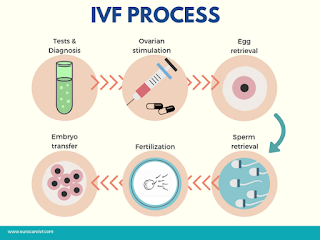Everything You Need to Know About PCOS/PCOD
Polycystic
ovary syndrome or PCOS is a hormonal disorder that affects women in their
childbearing years. So, how common is PCOS? Well, every year in India,
more than 1 million cases of it come into notice, and thus it is deemed as a the common problem now.
Speaking
of the age group that this condition mostly affects, then it includes females
from the age of 14 years to 60 years. However, most people get confused with
PCOS and PCOD which expands for polycystic ovarian disease. While both are
associated with ovaries, PCOS is deemed to be an endocrine system disorder and
PCOD is developed due to hormonal imbalance.
To
understand both these conditions, it is important to understand the functioning
of ovaries first. Ovaries in women alternately release an egg every month. Besides
producing female hormones that regulate things like period schedule, hair
development, fertility, and so on, they also secrete male hormones or androgens
in very small quantities. And when they start producing male hormones more than
usual, it creates an imbalance of hormones which becomes a major contributing
factor for PCOS and PCOD.
Let
us delve deeper to understand more about PCOS and PCOD.
Difference between PCOS and PCOD
In terms of severity, PCOS is a more
serious condition than PCOD. However, PCOD is more common than PCOS.
Speaking of the complications, women with
this condition are highly prone to health complications like hypertension,
cardiovascular problems, obesity, diabetes, and even endometrial cancer.
As compared to PCOD, PCOS tend to appear
earlier in life. In most cases, it is found to be visible in the teenage years
with symptoms like excessive hair growth, acne, and metabolic issues like
weight gain.
Women with PCOS might have significant
fertility issues than those who have PCOD. Also, severe cases of PCOS may lead
to anovulation while women with PCOD may not have such complications and still
ovulate.
Effects of PCOD/PCOS
Speaking of some of the well-known effects of PCOD/PCOS on the body, these include:
·
Irregular
periods
·
Excess
hair growth (hirsutism)
·
Loss
of scalp hair
·
Obesity
or weight gain
·
Dark
patches of skin in folds and creases
·
Acne/oil
skin
·
Polycystic
ovaries
·
Infertility
Is PCOS/PCOD curable?
So, is PCOD curable or PCOS for that
matter? Unfortunately, there are no sure shot ways to fix these conditions. However,
these conditions can be managed through different treatment options that
include medications to regularise periods, control cholesterol, and balance
hormones to increase fertility and remove excess hair. Besides, the doctor may
ask the women for self-care that includes physical exercise and weight loss.
As soon as a woman notices any of these signs and
symptoms, they must not delay and consult their doctor to receive timely
treatment so that the condition does not create any health trouble.



My friend went through an IVF procedure at one of the Best IVF Centre in Bathinda, and now she has successfully conceived.
ReplyDeleteUseful information about infertility, great effort from the author, additionally, here you can know about Best IVF Hospital in Rwanda.
ReplyDelete